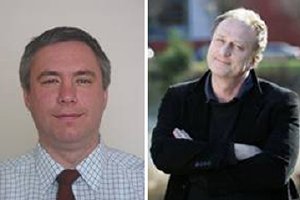Nov 4 2010
Aston University is strengthening its world leading photonics research with two new international partnerships set to advance laser telecommunications and nanotechnologies.
Dr Alex Rozhin and Professor Sergei Turitysn from Aston’s Photonics Research Group will be leading research into carbon nanotubes in fibre laser usage and telecommunications and sensing applications of ultra-long fibre lasers respectively, after securing two Marie Curie grants through the International Research Staff Exchange Scheme (IRSES).
 Dr Alex Rozhin and Professor Sergei Turitysn
Dr Alex Rozhin and Professor Sergei Turitysn
The Aston academics will be working with research centres of excellence and research groups from Germany, Finland, Russia, Belgium and Ukraine thanks to funding secured from the scheme. The aim behind the award is to establish and strengthen long-term research partnerships between European research organisations and international teams from countries which have a science and technology agreement with the European Union.
The first project led by Dr Alex Rozhin lies at the interface of nanotechnologies and photonics, with the development of carbon nanotubes in fibre lasers applications. Carbon nanotubes are a relatively new allotrope of carbon which are excellent conductors arranged in the shape of a cylinder and are the strongest fibre available. Depending on growth conditions, the synthesised tube can possess the strong optical properties in the broad spectra range, creating a wealth of research opportunities including in biological and environmental sensing, medical lasers development and telecommunication technologies.
The second project led by Professor Sergei Turitysn targets an emerging area of ultra-long fibre lasers and random fibre lasers and their telecommunication and sensing applications. Prof Turitsyn has already led a team which last year created a 270km optical fibre laser – making it the world’s longest laser. They believe it will lead to a radical new outlook on information transmission and secure communications.
Professor Turitsyn, said; “These projects will help foster international research collaborations with overseas centres of excellence in photonics and nanotechnologies.
This will undoubtedly strengthen Aston’s Photonics Research Group's international research, allowing Aston researchers and students to gain even greater access to advanced photonic technologies, facilities and infrastructure at Aston and across the world.”